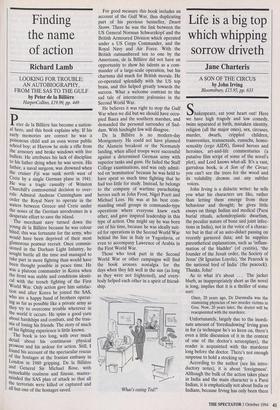Finding the name of action
Richard Lamb
LOOKING FOR TROUBLE: AN AUTOBIOGRAPHY, FROM THE SAS TO THE GULF by Peter de la Billiere HarperCollins, 179.99, pp. 449 Peter de la Billiere has become a nation- al hero, and this book explains why. If his early memories are correct he was a poisonous child and an even worse public school boy; at Harrow he stole a rifle from the armoury and broke windows with live bullets. He attributes his lack of discipline to his father dying when he was seven. His father, a naval surgeon, was drowned when the cruiser Fiji was sunk north west of Crete by a single German plane in 1941. He was a tragic casualty of Winston Churchill's controversial decision to over- rule Admiral Andreas Cunningham and order the Royal Navy to operate in the waters between Greece and Crete under the noses of the German aerodromes in a desperate effort to save the island.
The merchant navy turned down the Young de la Billiere because he was colour blind; this was fortunate for the army, who would have been deprived of their most glamorous postwar recruit. Once commis- sioned in the Durham Light Infantry, he sought battle all the time and managed to take part in more fighting than would have been thought possible in peace time. He was a platoon commander in Korea when the front was stable and conditions identi- cal with the trench fighting of the First World War. Only action gave him satisfac- tion and after Korea he joined the SAS, Who are a happy band of brothers operat- ing as far as possible like a private army as they try to overcome trouble wherever in the world it occurs. He spins a good yarn about hardships and combats, and the trau- ma of losing his friends. The story of much of his fighting experience is little known. The book is too long, with over much detail about his continuous physical Prowess and his ardour for action. Still, I found his account of the spectacular rescue of the hostages at the Iranian embassy in London in 1980 gripping. De la Billiere and General Sir Michael Rose, with remarkable coolness and finesse, master- minded the SAS plan of attack so that all the terrorists were killed or captured and all but one of the hostages saved. For good measure this book includes an account of the Gulf War, thus duplicating part of his previous bestseller, Desert Storm. There he was the link between the US General Norman Schwarzkopf and the British Armoured Division which operated under a US Corps Commander, and the Royal Navy and Air Force. With the British outnumbered ten to one by the Americans, de la Billiere did not have an opportunity to show his talents as a com- mander of a large-scale operation, but his charisma did much for British morale. He co-operated splendidly with the US top brass, and this helped greatly towards the success. What a welcome contrast to the sad tale of internecine jealousies in the Second World War.
He believes it was right to stop the Gulf War when we did but we should have occu- pied Basra and the southern marshes, and demanded the personal surrender of Sad- dam. With hindsight few will disagree.
De la Billiere is no modern-day Montgomery. He could not have planned the Alamein breakout or the Normandy landing, when allied troops were successful against a determined German army with superior tanks and guns. He failed the Staff College examinations, and was only admit- ted on 'nomination' because he was held to have spent so much time fighting that he had too little for study. Instead, he belongs to the company of wartime parachuting heroes such as John Frost, Nigel Poett and Michael Lees. He was at his best com- manding small groups in commando-type operations where everyone knew each other, and gave inspired leadership in this type of action. One might say he was born out of his time, because he was ideally suit- ed for operations in the Second World War behind the line in Italy or Yugoslavia, or even to accompany Lawrence of Arabia in the First World War.
Those who took part in the Second World War or other campaigns will find the book arouses nostalgia for the days when they felt well in the sun (as long as they were not frightened), and every- body helped each other in a spirit of friend- ship.
`What's eating Ted?'


























































 Previous page
Previous page